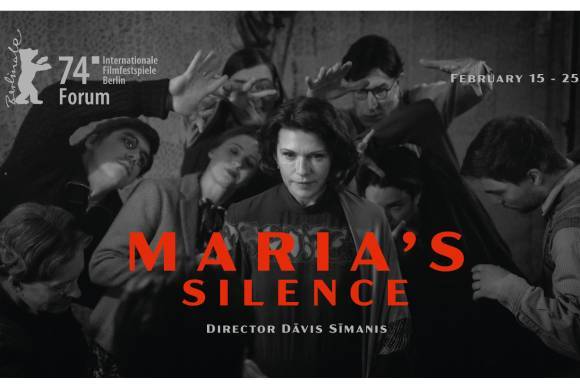‘Maria’s Silence’ by Dāvis Sīmanis is a historical drama based on the true story of the German silent film and theatre star Maria Leiko (Leyko) – a famous actress who late in her career has to decide between fame and love for her grandchild, between her ideals or the lies of Stalin’s totalitarian regime. Maria is tricked to travel to Stalin’s Russia in search for her daughter only to discover that the daughter has died giving birth to a little girl. Having a motherless baby on her hands and being offered a new career in a Soviet theatre Maria decides to stay in the red-terror torn Russia.
The film ‘Maria’s Silence’ will be a consistent continuation of the director’s work on the history of the 20th century. Dāvis Sīmanis’s previous films have premiered internationally – “Exiled” (2016) and “The Mover” (2018) at the Moscow International Film Festival, “The Year before the War” at the International Film Festival Rotterdam (2021)
“Maria Leiko’s life is the perfect ground to reveal the scale of cruelty of a demonic political regime and to tell a biographical story of a strong personality and outstanding actress. She experienced the most progressive and creative period of the 20th century, playing in Friedrich Wilhelm Murnau’s films or on stage at the Bertolt Brecht’s German political theatre. She had socialist dreams of an ideal society where everyone’s rights would be honored, and the majority of people would not be condemned to a miserable existence. Although Leiko’s attempts to take a stance against the brutality of the totalitarianism of the interwar period led to her death. Yet she has left us with a powerful historical lesson and a narratively rich closing chapter of her life“– says the director of the film Dāvis Sīmanis.
The production team of the film comprises director Dāvis Sīmanis, cinematographer Andrejs Rudzāts, screenwriters Dāvis Sīmais, Magali Negroni and Tabita Rudzāte, set designer Kristīne Jurjāne, make-up designer Beata Rjabovska, composer Paulius Kilbauskas, Justas Štaras,sound designer Jonas Maksvytis, editor Ieva Veiveryte. Lead roles are played by Olga Šepicka, Artūrs Skrastiņš, Ģirts Ķesteris, Inese Kučinska and Vilis Daudziņš, it is produced by Gints Grūbe and Inese Boka-Grūbe, co-produced by Juste Michailinaite and Kestutis Drazdauskas.
“The fact that ‘Maria’s Silence’ will have its world premiere at the 74th Berlin International Film Festival makes us think about the twists and turns of history and how they have affected the life story of the prototype of the film’s protagonist, actress Maria Leiko (Leyko). In the 1930s, the actress fled Nazi Germany and ended up in Stalin’s Russia. Today, when Russia is trying to minimize Stalin’s crimes, it is also important to talk about artists’ collaboration with a criminal power. It becomes evident that the concealed pages of the 20th century history can reveal much about the contemporary world of power, making us think about the relationship between intellectuals and power and the possible consequences of this relationship. The life story of Maria Leiko is one of the “blank spots” in European history," says producer Gints Grūbe.
The film received backing from the National Film Centre of Latvia, the Lithuanian Film Centre, Latvian Television, Creative Europe Media Programme, the project was developed at ScriptEast workshop and EAVE.
“I am delighted that the Latvian feature film ‘Maria’s Silence’ by Dāvis Sīmanis has been selected for such an important and prestigious screening as the Berlin International Film Festival. The story of the Latvian-born actress Marija Leiko (a.k.a. Leyko) (1887-1938), who rose to fame in Germany and was murdered in Moscow, is not only a reminder of Stalin’s reign of terror, in which the actors of the Latvian theatre Skatuve were also exterminated, but also an ambitious recreation of the era. The story of the film ‘Maria’s Silence’ shows the irrationality of totalitarian regimes’ repression and their total disregard for the individual, in essence, their collective insanity. It is also a very concrete historical tribute to a strong woman who translates the tragic events of the 20th century through her individual fate. Needless to say, the collective insanity and the stench of totalitarianism is not only a thing of the past, but also a disturbing reality of our times,“ says Dita Rietuma, Head of the National Film Center Latvia.
Mistrus Media film production company has previously produced ‘The Mover’ (2018) by director Dāvis Sīmanis, shown as part of the competition programme at the Moscow International Film Festival. The list of the studio’s production includes Viesturs Kairišs’ feature drama ‘January’ that was premiered at the Tribeca Film Festival 2022 and received the Best International Narrative Award and other historically-themed films like the co-production ‘In the Dusk’ by Šarūnas Bartas, part of the official programme at 2020 Cannes Film Festival; ‘Natural Light’ by Dénes Nagy, a film that premiered as part of the 2021 programme of Berlin International Film Festival and was awarded a Silver Bear in the Best Director category. The studio also produced a TV series ‘Emily. Queen of the Press’ and director Aik Karapetian’s ‘Samuel’s Travels’ that saw its first screening as part of the competition programme at Fantastic Fest in Austin (USA).




















